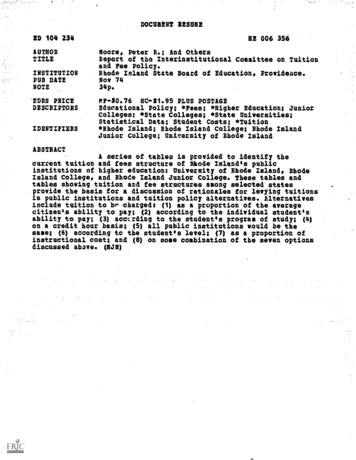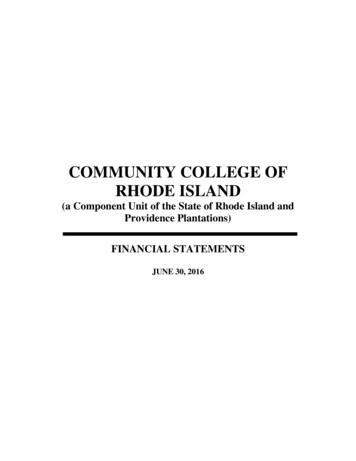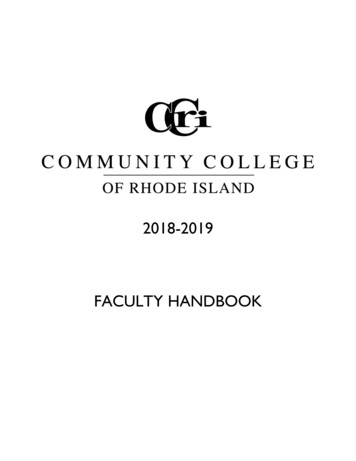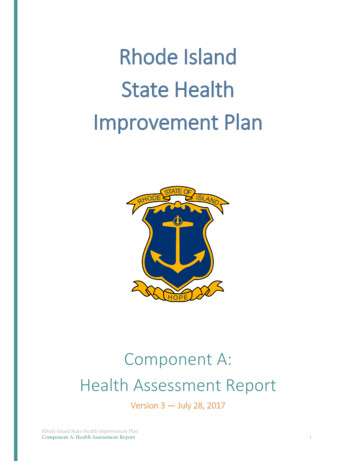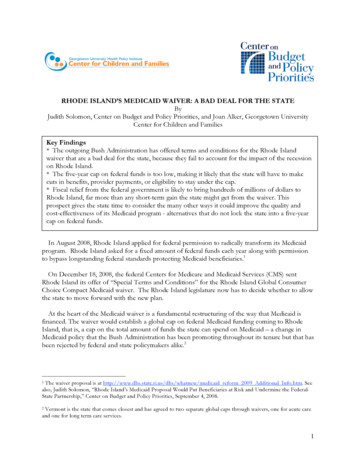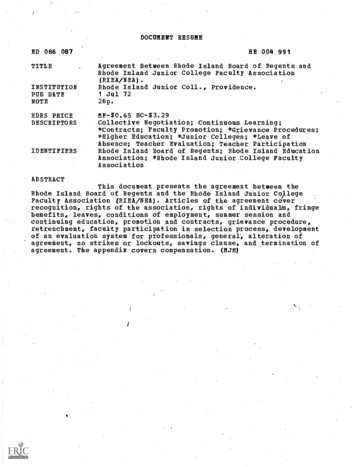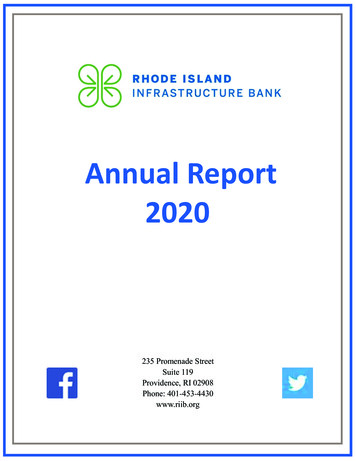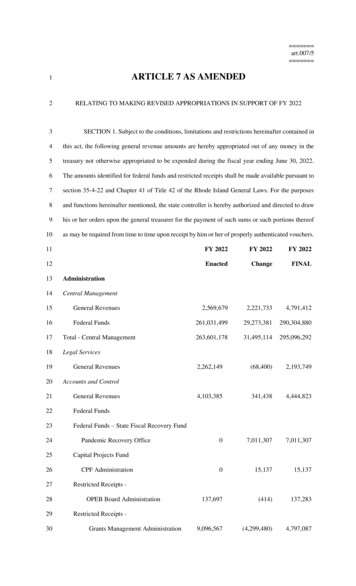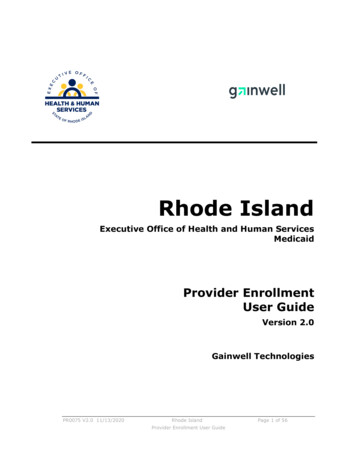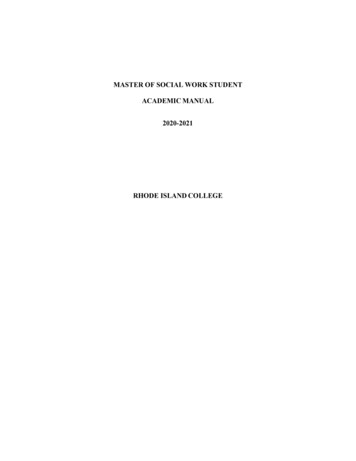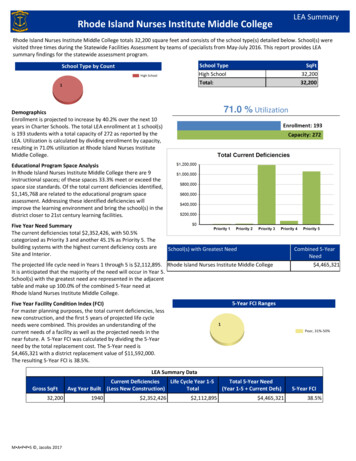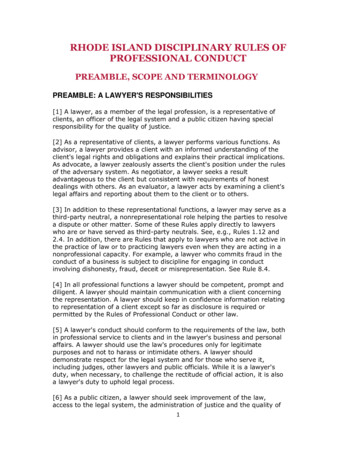
Transcription
RHODE ISLAND DISCIPLINARY RULES OFPROFESSIONAL CONDUCTPREAMBLE, SCOPE AND TERMINOLOGYPREAMBLE: A LAWYER'S RESPONSIBILITIES[1] A lawyer, as a member of the legal profession, is a representative ofclients, an officer of the legal system and a public citizen having specialresponsibility for the quality of justice.[2] As a representative of clients, a lawyer performs various functions. Asadvisor, a lawyer provides a client with an informed understanding of theclient's legal rights and obligations and explains their practical implications.As advocate, a lawyer zealously asserts the client's position under the rulesof the adversary system. As negotiator, a lawyer seeks a resultadvantageous to the client but consistent with requirements of honestdealings with others. As an evaluator, a lawyer acts by examining a client'slegal affairs and reporting about them to the client or to others.[3] In addition to these representational functions, a lawyer may serve as athird-party neutral, a nonrepresentational role helping the parties to resolvea dispute or other matter. Some of these Rules apply directly to lawyerswho are or have served as third-party neutrals. See, e.g., Rules 1.12 and2.4. In addition, there are Rules that apply to lawyers who are not active inthe practice of law or to practicing lawyers even when they are acting in anonprofessional capacity. For example, a lawyer who commits fraud in theconduct of a business is subject to discipline for engaging in conductinvolving dishonesty, fraud, deceit or misrepresentation. See Rule 8.4.[4] In all professional functions a lawyer should be competent, prompt anddiligent. A lawyer should maintain communication with a client concerningthe representation. A lawyer should keep in confidence information relatingto representation of a client except so far as disclosure is required orpermitted by the Rules of Professional Conduct or other law.[5] A lawyer's conduct should conform to the requirements of the law, bothin professional service to clients and in the lawyer's business and personalaffairs. A lawyer should use the law's procedures only for legitimatepurposes and not to harass or intimidate others. A lawyer shoulddemonstrate respect for the legal system and for those who serve it,including judges, other lawyers and public officials. While it is a lawyer'sduty, when necessary, to challenge the rectitude of official action, it is alsoa lawyer's duty to uphold legal process.[6] As a public citizen, a lawyer should seek improvement of the law,access to the legal system, the administration of justice and the quality of1
service rendered by the legal profession. As a member of a learnedprofession, a lawyer should cultivate knowledge of the law beyond its usefor clients, employ that knowledge in reform of the law and work tostrengthen legal education. In addition, a lawyer should further the public'sunderstanding of and confidence in the rule of law and the justice systembecause legal institutions in a constitutional democracy depend on popularparticipation and support to maintain their authority. A lawyer should bemindful of deficiencies in the administration of justice and of the fact thatthe poor, and sometimes persons who are not poor, cannot afford adequatelegal assistance. Therefore, all lawyers should devote professional time andresources and use civic influence to ensure equal access to our system ofjustice for all those who because of economic or social barriers cannotafford or secure adequate legal counsel. A lawyer should aid the legalprofession in pursuing these objectives and should help the bar regulateitself in the public interest.[7] Many of a lawyer's professional responsibilities are prescribed in theRules of Professional Conduct, as well as substantive and procedural law.However, a lawyer is also guided by personal conscience and theapprobation of professional peers. A lawyer should strive to attain thehighest level of skill, to improve the law and the legal profession and toexemplify the legal profession's ideals of public service.[8] A lawyer's responsibilities as a representative of clients, an officer of thelegal system and a public citizen are usually harmonious. Thus, when anopposing party is well represented, a lawyer can be a zealous advocate onbehalf of a client and at the same time assume that justice is being done.So also, a lawyer can be sure that preserving client confidences ordinarilyserves the public interest because people are more likely to seek legaladvice, and thereby heed their legal obligations, when they know theircommunications will be private.[9] In the nature of law practice, however, conflicting responsibilities areencountered. Virtually all difficult ethical problems arise from conflictbetween a lawyer's responsibilities to clients, to the legal system and to thelawyer's own interest in remaining an ethical person while earning asatisfactory living. The Rules of Professional Conduct often prescribe termsfor resolving such conflicts. Within the framework of these Rules, however,many difficult issues of professional discretion can arise. Such issues mustbe resolved through the exercise of sensitive professional and moraljudgment guided by the basic principles underlying the Rules. Theseprinciples include the lawyer's obligation zealously to protect and pursue aclient's legitimate interests, within the bounds of the law, while maintaininga professional, courteous and civil attitude toward all persons involved inthe legal system.[10] The legal profession is largely self-governing. Although otherprofessions also have been granted powers of self-government, the legalprofession is unique in this respect because of the close relationship2
between the profession and the processes of government and lawenforcement. This connection is manifested in the fact that ultimateauthority over the legal profession is vested largely in the courts.[11] To the extent that lawyers meet the obligations of their professionalcalling, the occasion for government regulation is obviated. Self-regulationalso helps maintain the legal profession's independence from governmentdomination. An independent legal profession is an important force inpreserving government under law, for abuse of legal authority is morereadily challenged by a profession whose members are not dependent ongovernment for the right to practice.[12] The legal profession's relative autonomy carries with it specialresponsibilities of self-government. The profession has a responsibility toassure that its regulations are conceived in the public interest and not infurtherance of parochial or self-interested concerns of the bar. Every lawyeris responsible for observance of the Rules of Professional Conduct. A lawyershould also aid in securing their observance by other lawyers. Neglect ofthese responsibilities compromises the independence of the profession andthe public interest which it serves.[13] Lawyers play a vital role in the preservation of society. The fulfillmentof this role requires an understanding by lawyers of their relationship to ourlegal system. The Rules of Professional Conduct, when properly applied,serve to define that relationship.SCOPE[14] The Rules of Professional Conduct are rules of reason. They should beinterpreted with reference to the purposes of legal representation and ofthe law itself. Some of the Rules are imperatives, cast in the terms "shall"or "shall not." These define proper conduct for purposes of professionaldiscipline. Others, generally cast in the term "may," are permissive anddefine areas under the Rules in which the lawyer has discretion to exerciseprofessional judgment. No disciplinary action should be taken when thelawyer chooses not to act or acts within the bounds of such discretion.Other Rules define the nature of relationships between the lawyer andothers. The Rules are thus partly obligatory and disciplinary and partlyconstitutive and descriptive in that they define a lawyer's professional role.Many of the Comments use the term "should." Comments do not addobligations to the Rules but provide guidance for practicing in compliancewith the Rules.[15] The Rules presuppose a larger legal context shaping the lawyer's role.That context includes court rules and statutes relating to matters oflicensure, laws defining specific obligations of lawyers and substantive andprocedural law in general. The Comments are sometimes used to alertlawyers to their responsibilities under such other law.3
[16] Compliance with the Rules, as with all law in an open society, dependsprimarily upon understanding and voluntary compliance, secondarily uponreinforcement by peer and public opinion and finally, when necessary, uponenforcement through disciplinary proceedings. The Rules do not, however,exhaust the moral and ethical considerations that should inform a lawyer,for no worthwhile human activity can be completely defined by legal rules.The Rules simply provide a framework for the ethical practice of law.[17] Furthermore, for purposes of determining the lawyer's authority andresponsibility, principles of substantive law external to these Rulesdetermine whether a client-lawyer relationship exists. Most of the dutiesflowing from the client-lawyer relationship attach only after the client hasrequested the lawyer to render legal services and the lawyer has agreed todo so. But there are some duties, such as that of confidentiality under Rule1.6, that attach when the lawyer agrees to consider whether a client-lawyerrelationship shall be established. See Rule 1.18. Whether a client-lawyerrelationship exists for any specific purpose can depend on thecircumstances and may be a question of fact.[18] Under various legal provisions, including constitutional, statutory andcommon law, the responsibilities of government lawyers may includeauthority concerning legal matters that ordinarily reposes in the client inprivate client-lawyer relationships. For example, a lawyer for a governmentagency may have authority on behalf of the government to decide uponsettlement or whether to appeal from an adverse judgment. Such authorityin various respects is generally vested in the attorney general and thestate's attorney in state government, and their federal counterparts, andthe same may be true of other government law officers. Also, lawyersunder the supervision of these officers may be authorized to representseveral government agencies in intragovernmental legal controversies incircumstances where a private lawyer could not represent multiple privateclients. These Rules do not abrogate any such authority.[19] Failure to comply with an obligation or prohibition imposed by a Rule isa basis for invoking the disciplinary process. The Rules presuppose thatdisciplinary assessment of a lawyer's conduct will be made on the basis ofthe facts and circumstances as they existed at the time of the conduct inquestion and in recognition of the fact that a lawyer often has to act uponuncertain or incomplete evidence of the situation. Moreover, the Rulespresuppose that whether or not discipline should be imposed for a violation,and the severity of a sanction, depend on all the circumstances, such as thewillfulness and seriousness of the violation, extenuating factors andwhether there have been previous violations.[20] Violation of a Rule should not itself give rise to a cause of actionagainst a lawyer nor should it create any presumption in such a case that alegal duty has been breached. In addition, violation of a Rule does notnecessarily warrant any other nondisciplinary remedy, such asdisqualification of a lawyer in pending litigation. The Rules are designed to4
provide guidance to lawyers and to provide a structure for regulatingconduct through disciplinary agencies. They are not designed to be a basisfor civil liability. Furthermore, the purpose of the Rules can be subvertedwhen they are invoked by opposing parties as procedural weapons. The factthat a Rule is a just basis for a lawyer's self-assessment, or for sanctioninga lawyer under the administration of a disciplinary authority, does not implythat an antagonist in a collateral proceeding or transaction has standing toseek enforcement of the Rule. Nevertheless, since the Rules do establishstandards of conduct by lawyers, a lawyer's violation of a Rule may beevidence of breach of the applicable standard of conduct.[21] The Comment accompanying each Rule explains and illustrates themeaning and purpose of the Rule. The Preamble and this note on Scopeprovide general orientation. The Comments are intended as guides tointerpretation, but the text of each Rule is authoritative.Rule 1.0. TERMINOLOGY(a) "Belief" or "believes" denotes that the person involved actuallysupposed the fact in question to be true. A person's belief may be inferredfrom circumstances.(b) "Confirmed in writing," when used in reference to the informedconsent of a person, denotes informed consent that is given in writing bythe person or a writing that a lawyer promptly transmits to the personconfirming an oral informed consent. See paragraph (e) for the definition of"informed consent." If it is not feasible to obtain or transmit the writing atthe time the person gives informed consent, then the lawyer must obtain ortransmit it within a reasonable time thereafter.(c) "Firm" or "law firm" denotes a lawyer or lawyers in a law partnership,professional corporation, sole proprietorship or other association authorizedto practice law; or lawyers employed in a legal services organization or thelegal department of a corporation or other organization.(d) "Fraud" or "fraudulent" denotes conduct that is fraudulent under thesubstantive or procedural law of the applicable jurisdiction and has apurpose to deceive(e) "Informed consent" denotes the agreement by a person to a proposedcourse of conduct after the lawyer has communicated adequate informationand explanation about the material risks of and reasonably availablealternatives to the proposed course of conduct.(f) "Knowingly," "known," or "knows" denotes actual knowledge of thefact in question. A person's knowledge may be inferred from circumstances.5
(g) "Partner" denotes a member of a partnership, a shareholder in a lawfirm organized as a professional corporation, or a member of an associationauthorized to practice law.(h) "Reasonable" or "reasonably" when used in relation to conduct by alawyer denotes the conduct of a reasonably prudent and competent lawyer.(i) "Reasonable belief" or "reasonably believes" when used in referenceto a lawyer denotes that the lawyer believes the matter in question andthat the circumstances are such that the belief is reasonable.(j) "Reasonably should know" when used in reference to a lawyerdenotes that a lawyer of reasonable prudence and competence wouldascertain the matter in question.(k) "Screened" denotes the isolation of a lawyer from any participation in amatter through the timely imposition of procedures within a firm that arereasonably adequate under the circumstances to protect information thatthe isolated lawyer is obligated to protect under these Rules or other law.(l) "Substantial" when used in reference to degree or extent denotes amaterial matter of clear and weighty importance.(m) "Tribunal" denotes a court, an arbitrator in a binding arbitrationproceeding or a legislative body, administrative agency or other body actingin an adjudicative capacity. A legislative body, administrative agency orother body acts in an adjudicative capacity when a neutral official, after thepresentation of evidence or legal argument by a party or parties, will rendera binding legal judgment directly affecting a party's interests in a particularmatter.(n) "Writing" or "written" denotes a tangible or electronic record of acommunication or representation, including handwriting, typewriting,printing, photostating, photography, audio or videorecording and e-mail. A"signed" writing includes an electronic sound, symbol or process attachedto or logically associated with a writing and executed or adopted by aperson with the intent to sign the writing.LAWYER-CLIENT RELATIONSHIPRule 1.1. CompetenceA lawyer shall provide competent representation to a client. Competentrepresentation requires the legal knowledge, skill, thoroughness andpreparation reasonably necessary for the representation.6
Comment - Rule 1.1Legal Knowledge and Skill[1] In determining whether a lawyer employs the requisite knowledge andskill in a particular matter, relevant factors include the relative complexityand specialized nature of the matter, the lawyer's general experience, thelawyer's training and experience in the field in question, the preparationand study the lawyer is able to give the matter and whether it is feasible torefer the matter to, or associate or consult with, a lawyer of establishedcompetence in the field in question. In many instances, the requiredproficiency is that of a general practitioner. Expertise in a particular field oflaw may be required in some circumstances.[2] A lawyer need not necessarily have special training or prior experienceto handle legal problems of a type with which the lawyer is unfamiliar. Anewly admitted lawyer can be as competent as a practitioner with longexperience. Some important legal skills, such as the analysis of precedent,the evaluation of evidence and legal drafting, are required in all legalproblems. Perhaps the most fundamental legal skill consists of determiningwhat kind of legal problems a situation may involve, a skill that necessarilytranscends any particular specialized knowledge. A lawyer can provideadequate representation in a wholly novel field through necessary study.Competent representation can also be provided through the association of alawyer of established competence in the field in question.[3] In an emergency a lawyer may give advice or assistance in a matter inwhich the lawyer does not have the skill ordinarily required where referralto or consultation or association with another lawyer would be impractical.Even in an emergency, however, assistance should be limited to thatreasonably necessary in the circumstances, for ill considered action underemergency conditions can jeopardize the client's interest.[4] A lawyer may accept representation where the requisite level ofcompetence can be achieved by reasonable preparation. This applies aswell to a lawyer who is appointed as counsel for an unrepresented person.See also Rule 6.2Thoroughness and Preparation[5] Competent handling of a particular matter includes inquiry into andanalysis of the factual and legal elements of the problem, and use ofmethods and procedures meeting the standards of competent practitioners.It also includes adequate preparation. The required attention andpreparation are determined in part by what is at stake; major litigation andcomplex transactions ordinarily require more elaborate treatment thanmatters of lesser consequence.7
Maintaining Competence[6] To maintain the requisite knowledge and skill, a lawyer should engagein continuing study and education. If a system of peer review has beenestablished, the lawyer should consider making use of it in appropriatecircumstances.1.1:100 Comparative Analysis of Rhode Island Rule Primary Rhode Island References: RI Rule 1.1 Background References: ABA Model Rule 1.1,Other Jurisdictions Commentary:1.1:101 Model Rule ComparisonRhode Island has adopted MR 1.1 including the Comments thereto.1.1:102 Model Code ComparisonRhode Island has not adopted a Model Code comparison. See MR 1.1 andother jurisdictions.1.1:200 Disciplinary Standard of Competence Primary Rhode Island References: RI Rule 1.1 Background References: ABA Model Rule 1.1,Other Jurisdictions Commentary: ABA/BNA 31:201, ALI-LGL 16,Wolfram 5.1Attorney's failure to effectuate service of process in timely manner, and hisinability to appreciate requirement of timely service, demonstrateincompetence. In the Matter of Krause, 737 A.2d 874 (R.I. 1999).There is no other authority in RI concerning the disciplinary standard ofcompetence. As stated in the Comment to the Rule, in determining whethera lawyer employs the requisite knowledge and skill in a particular matter,relevant factors include the complexity and specialized nature of thematter, the lawyer's general experience and other related factors.8
1.1:300 Malpractice Liability Primary Rhode Island References: RI Rule 1.1 Background References: ABA Model Rule 1.1,Other Jurisdictions Commentary: ABA/BNA 301:101, ALI-LGL 49-54 , Wolfram 5.6Plaintiff in a legal malpractice action based on negligence must produceevidence of any damages resulting to her legal position or to her legaldetriment personally as a result of her attorney's activities, i.e.,inappropriate sexual activities. Dal Rosario Vallinoto v. DiSandro, 688A.2d 830 (R.I. 1997). In this case the Court found that plaintiff failed toproduce any evidence of damages and therefore failed in her legal action.1.1:310 Relevance of Ethics Codes in Malpractice ActionsThe Scope section of the Preamble of the RI Rules provides that violation ofa Rule should neither give rise to a cause of action nor should it create anypresumption that a legal duty has been breached. The section furtherprovides that the Rules are not designed to be the basis for civil liability.There is no other authority in Rhode Island on this topic.1.1:320 Duty to ClientNotarizing Photostatted deed containing signatures of parties to correcterror in deed's transcription, and recording Photostatted deed in landrecords without notifying parties, constitutes dishonesty and fraud, andjustifies suspension from practice of law for six months, despite attorney'ssincere remorse. Lisi v. Gallucci, 602 A.2d 938 (R.I. 1992).Failure to communicate with clients regarding reasonable requests forinformation, failure to respond to lawful demands for information fromdisciplinary counsel, and failure to act with necessary competence and duediligence warrants public censure and supervision of practice. In re Rosen,637 A.2d 1378 (1994).Attorney's public reprimand in Massachusetts for leading client to believethat case had been filed, but then waiting almost three years to notify clientthat case was meritless and had not been filed, warranted reciprocaldiscipline of public censure. In re Frank, 706 A.2d 927 (R.I. 1998).Attorney failed to provide competent representation to client by advisingclient to list property for sale in absence of proper foreclosure; attorney'spoor advice evidenced that he lacked the legal knowledge necessary to9
represent client in foreclosure proceedings. In re Holland, 713 A.2d 227(R.I. 1998).An attorney may not condition continued representation of client uponclient's release of another lawyer from liability. To do so wouldimpermissibly circumscribe Client's options and compromise the quality ofthe representation, contrary to RI Rule 1.1. RI Eth. Op. 90-37 (1990).As stated in RI Rule 1.1, a lawyer has the duty to provide competentrepresentation to a client and to provide that representation loyally and inthe exercise of the lawyer's independent professional judgment. See alsoComment to RI Rule 1.7.1.1:330 Standard of CareThere is no authority in Rhode Island on this topic.1.1:335 Requirement of Expert TestimonyThere is no authority in Rhode Island on this topic.1.1:340 Causation and DamagesSee DiSandro case, supra, under 1.1:300 Malpractice Liability, supra.1.1:350 Waiver of Prospective LiabilitySee Section 1.2:240, infra.1.1:360 Settlement of Client's Malpractice ClaimThere is no authority in Rhode Island on this topic.1.1:370 Defenses to Malpractice ClaimThere is no authority in Rhode Island on this topic.1.1:380 Liability to Client for Breach of Contract, Breach ofFiduciary Duty, and Other LiabilitiesThere is no authority in Rhode Island on this topic.1.1:390 Liability Where Non-Lawyer Would Be LiableThere is no authority in Rhode Island on this topic.1.1:400 Liability to Certain Non-Clients10
Primary Rhode Island References: RI Rule 1.1 Background References: ABA Model Rule 1.1,Other Jurisdictions Commentary: ABA/BNA 71:1101, ALI-LGL 51, Wolfram 5.61.1:410 Duty of Care to Certain Non-ClientsAn attorney has no general duty to the opposing party, although anattorney does owe a duty to an adverse party not to participate infraudulent conduct. Thus, a third party ordinarily does not have standing topursue a claim for tortuous interference with a contract against his/heradversary's attorney. Toste Farm Corp. v. Hadbury, Inc., 798 A.2d 901(R.I. 2002). Beneficiaries of trust had standing to bring suit against lawfirm because the court determined that a trustee's attorney owes a duty ofcare to the trust beneficiaries. The voluntary assignment of a legalmalpractice claim by a trustee to the beneficiary is permissible under RhodeIsland law because the assignment is similar to market assignmentsinvolving purely economic transactions rather than to freestandingmalpractice personal injury claims. Am. Kennel Club Museum of the Dogex rel. Camilla Lyman Unitrust v. Edwards & Angell, LLP, 2002 WL1803923, (R.I. Super. Jul. 26, 2002).1.1:420 Reliance of Lawyer's Opinion [See also 2.3:300]See Section 2.3:300, infra.1.1:430 Assisting Unlawful Conduct [See also 1.2:600-1.2:630,infra]There is no authority in Rhode Island on this topic.1.1:440 Knowledge of Client's Breach of Fiduciary DutyThere is no authority in Rhode Island on this topic.1.1:450 Failing to Prevent Death or Bodily InjurySee Section on Rule 1.6, infra.1.1:500 Defenses and Exceptions to Liability Primary Rhode Island References: RI Rule 1.1 Background References: ABA Model Rule 1.1,Other Jurisdictions11
Commentary: ABA/BNA 301:1001, ALI-LGL 54, 57, Wolfram 5.61.1:510 Advocate's Defamation PrivilegeThere is no authority in Rhode Island on this topic.1.1:520 Wrongful Use of Civil Proceedings; Abuse of Process;False ArrestThere is no authority in Rhode Island on this topic.1.1:530 Assisting Client to Break a ContractThere is no authority in Rhode Island on this topic.1.1:600 Vicarious Liability [See 5.1:500]Rule 1.2. Scope of Representation andAllocation of Authority Between Clientand Lawyer(a) Subject to paragraphs (c) and (d), a lawyer shall abide by a client'sdecisions concerning the objectives of representation and, as required byRule 1.4, shall consult with the client as to the means by which they are tobe pursued. A lawyer may take such action on behalf of the client as isimpliedly authorized to carry out the representation. A lawyer shall abide bya client's decision whether to settle a matter. In a criminal case, the lawyershall abide by the client's decision, after consultation with the lawyer, as toa plea to be entered, whether to waive jury trial and whether the client willtestify.(b) A lawyer's representation of a client, including representation byappointment, does not constitute an endorsement of the client's political,economic, social or moral views or activities.(c) A lawyer may limit the scope of the representation if the limitation isreasonable under the circumstances and the client gives informed consent.(d) A lawyer shall not counsel a client to engage, or assist a client, inconduct that the lawyer knows is criminal or fraudulent, but a lawyer maydiscuss the legal consequences of any proposed course of conduct with aclient and may counsel or assist a client to make a good faith effort todetermine the validity, scope, meaning or application of the law.12
Comment - Rule 1.2Scope of Representation[1] Both lawyer and client have authority and responsibility in theobjectives and means of representation. The client has ultimate authority todetermine the purposes to be served by legal representation, within thelimits imposed by law and the lawyer's professional obligations. Withinthose limits, a client also has a right to consult with the lawyer about themeans to be used in pursuing those objectives. At the same time, a lawyeris not required to pursue objectives or employ means simply because theclient may wish that a lawyer do so. A clear distinction between objectivesand means sometimes cannot be drawn, and in many cases the clientlawyer relationship partakes of a joint undertaking. In questions of means,the lawyer should assume responsibility for technical and legal tacticalissues, but should defer to the client regarding such questions as theexpense to be incurred and concern for third persons who might beadversely affected.[2] In a case in which the client appears to be suffering mental disability,the lawyer's duty to abide by the client's decisions is to be guided byreference to Rule 1.14.Independence from Client's Views or Activities[3] Legal representation should not be denied to people who are unable toafford legal services, or whose cause is controversial or the subject ofpopular disapproval. By the same token, representing a client does notconstitute approval of a client's views or activities.Services Limited in Objectives or Means[4] The objectives or scope of services provided by a lawyer may be limitedby agreement with the client or by the terms under which the lawyer'sservices are made available to the client. For example, a retainer may befor a specifically defined purpose. Representation provided through a legalaid agency may be subject to limitations on the types of cases the agencyhandles. When a lawyer has been retained by an insurer to represent aninsured, the representation may be limited to matters related to theinsurance coverage. The terms upon which representation is undertakenmay exclude specific objectives or means. Such limitations may excludeobjectives or means that the lawyer regards as repugnant or imprudent.[5] An agreement concerning the scope of representation must accord withthe Rules of Professional Conduct and other law. Thus, the client may notbe asked to agree to representation so limited
permitted by the Rules of Professional Conduct or other law. [5] A lawyer's conduct should conform to the requirements of the law, both in professional service to clients and in the lawyer's business and personal affairs. A lawyer should use the law's procedures only for legitimate purposes and not to harass or intimidate others. A lawyer should
